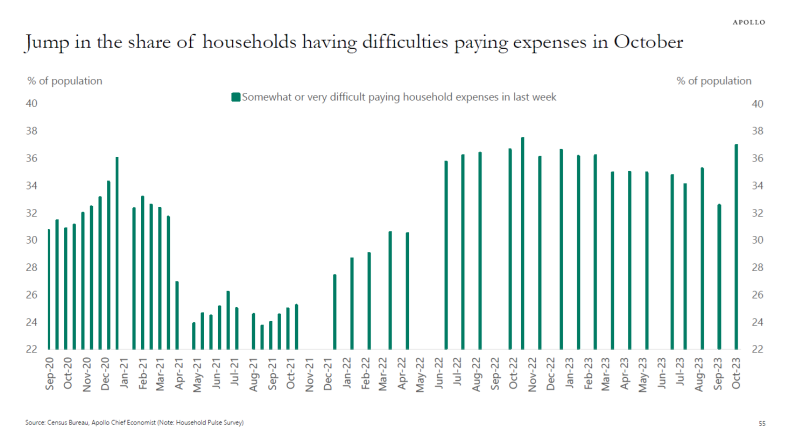Student loans: Early data shows repayments are already taking a toll
The restart of student loan payments may already be straining borrowers.
The Census Bureau found that 41.2% of adults reported difficulties paying household expenses in its latest household pulse survey that polled respondents from Sept. 20 to Oct. 2. That was up from 37.3% from the previous two-week polling period between Aug. 23 to Sept. 4 and the highest share on record since the survey first began asking that question in August 2020.
Specifically, "the difficulties with paying household expenses were concentrated among households with a college degree, making between $50,000 and $150,000, suggesting that restarting student loan payments is the source of increased financial stress for consumers," Torsten Slok, chief economist of Apollo Global Management, wrote this week. (Yahoo Finance is owned by Apollo Global Management.)
That data provides the earliest indications of the kind of impact those repayments — which started this month for nearly 27 million borrowers — could have on both households and the economy as a whole after the 43-month pause helped boost stability and allowed many borrowers to make financial strides.

"This is not surprising at all," Barry Coleman, vice president of program management and education at the National Foundation for Credit Counseling, wrote to Yahoo Finance about the Census data. "Borrowers have gotten used to spending money that they would have spent on student loan payments, on household necessities. I believe that it also shows that many are living paycheck to paycheck, with little or no savings accumulated to help absorb rising costs or financial shocks."
Surveys before the payments restarted — plus concerns from a handful of retail company executives — predicted similar troubles. A New York Life survey of 402 student loan borrowers in September found that 27% reported they were unsure how they would manage repaying their loans this month.
Additionally, borrowers added to their budget during the pause with 53% getting a new credit card, 36% taking out a car loan, and 15% now paying a mortgage or personal loan, a recent TransUnion study found.
"In the $50,000-$150,000 income range, some borrowers have taken on additional fixed expenses during the COVID payment freeze such as a new car payment or a larger housing expense," said Jared Costigan, a consultant at Student Loan Planner, "and are now feeling a squeeze on their budgets with the student loan payments."
While a study from the Federal Reserve Bank of New York last week found that borrowers said there was a 22.6% probability they would miss a student loan payment, the overall impact to the economy would ultimately be minimal. It estimated borrowers would reduce spending by $56 a month on average, resulting in a 0.1-percentage-point aggregate decline in spending from August levels.
Their were myriad reasons to anticipate a blunted effect, the study noted.
First, there’s evidence that many borrowers restarted payments even before the pause expired, so the impact to the economy has already been absorbed. Others received relief through various discharges overseen by the Biden administration, and many of the remaining borrowers can lower their monthly payments through the president’s new repayment plan called the Saving on a Valuable Education, or SAVE, plan.
Read more: Can you change your student loan repayment plan?
That's, of course, if borrowers can enroll in it, Ella Azoulay, a research and policy analyst at the Student Borrower Protection Center, told Yahoo Finance. Many borrowers are unaware of the program, while others have reported long wait times when trying to get in touch with their student loan servicers to enroll. So far, of the 4 million new SAVE enrollees, 3 million were automatically transferred from another repayment plan.
"It requires borrowers’ knowledge of the plan and it requires action," Azoulay said. "Borrowers are too overwhelmed or don't have the time or ability. Every bit of this is complicated."

Additionally, the SAVE plan leaves out parents who took out federal college loans for their children. They’re not eligible. Those may be among the adults who reported struggling in the Census report.
"The biggest place I have seen this manifest is ParentPlus loans because of the unforgiving nature [of those loans]," Justin Horsch, another consultant with Student Loan Planner, told Yahoo Finance. "They have a lot more borrowed, [and] rightly, [they are] much more nervous about paying thousands of dollars monthly."
Read more: Federal PLUS Loans: How do they work?
In his note, Apollo's Slok didn’t address those borrowers who never graduated from college, but are still paying back student loans. Before the pandemic, these borrowers were much more likely to fall in default, have lower incomes, or be unemployed, Azoulay said.
"I imagine things will be much worse financially for those borrowers who didn't graduate and will be receiving bills, too," Azoulay said.
For all of these reasons, the increase in households struggling with everyday expenses the Census detected could grow in the months to come.
"In the short term, it may get worse," Coleman said. "The reason is many consumers have simply put student loan repayment on the back burner and have not proactively considered how they will continue making student loan payments in the context of higher inflation."
Janna Herron is the personal finance and real estate editor for Yahoo Finance. Follow her on Twitter @JannaHerron.
Read the latest financial and business news from Yahoo Finance
